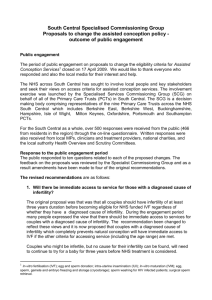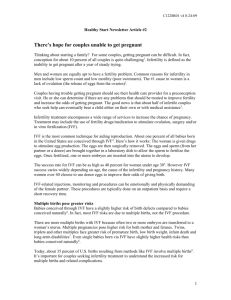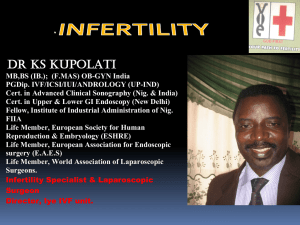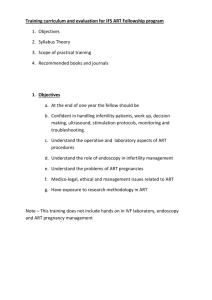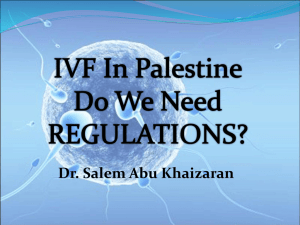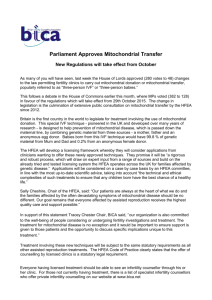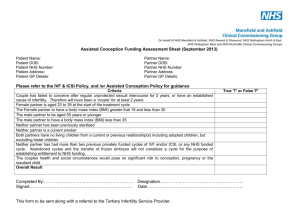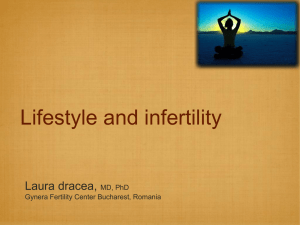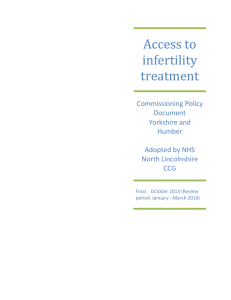Assisted conception - Fareham and Gosport CCG
advertisement
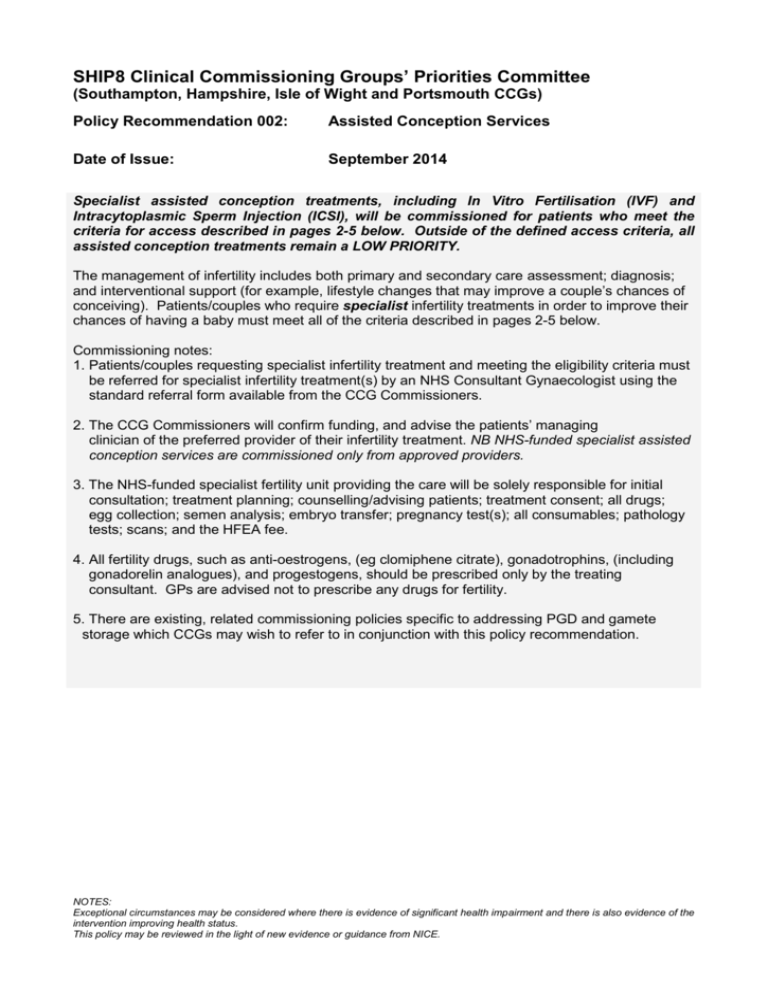
SHIP8 Clinical Commissioning Groups’ Priorities Committee (Southampton, Hampshire, Isle of Wight and Portsmouth CCGs) Policy Recommendation 002: Assisted Conception Services Date of Issue: September 2014 Specialist assisted conception treatments, including In Vitro Fertilisation (IVF) and Intracytoplasmic Sperm Injection (ICSI), will be commissioned for patients who meet the criteria for access described in pages 2-5 below. Outside of the defined access criteria, all assisted conception treatments remain a LOW PRIORITY. The management of infertility includes both primary and secondary care assessment; diagnosis; and interventional support (for example, lifestyle changes that may improve a couple’s chances of conceiving). Patients/couples who require specialist infertility treatments in order to improve their chances of having a baby must meet all of the criteria described in pages 2-5 below. Commissioning notes: 1. Patients/couples requesting specialist infertility treatment and meeting the eligibility criteria must be referred for specialist infertility treatment(s) by an NHS Consultant Gynaecologist using the standard referral form available from the CCG Commissioners. 2. The CCG Commissioners will confirm funding, and advise the patients’ managing clinician of the preferred provider of their infertility treatment. NB NHS-funded specialist assisted conception services are commissioned only from approved providers. 3. The NHS-funded specialist fertility unit providing the care will be solely responsible for initial consultation; treatment planning; counselling/advising patients; treatment consent; all drugs; egg collection; semen analysis; embryo transfer; pregnancy test(s); all consumables; pathology tests; scans; and the HFEA fee. 4. All fertility drugs, such as anti-oestrogens, (eg clomiphene citrate), gonadotrophins, (including gonadorelin analogues), and progestogens, should be prescribed only by the treating consultant. GPs are advised not to prescribe any drugs for fertility. 5. There are existing, related commissioning policies specific to addressing PGD and gamete storage which CCGs may wish to refer to in conjunction with this policy recommendation. NOTES: Exceptional circumstances may be considered where there is evidence of significant health impairment and there is also evidence of the intervention improving health status. This policy may be reviewed in the light of new evidence or guidance from NICE. Criteria for Access to IVF and Related Fertility Treatments 1.1 All women will be expected to have gone through the primary and secondary care pathways as defined in the NICE Clinical Practice Algorithm1 appropriate to them before eligibility for IVF is considered. 1.2 CCGs will fund one cycle of IVF treatment per eligible couple. In cases where this cycle is abandoned for medical reasons, a new cycle of ovarian stimulation will be funded. 1.3 In line with HFEA strategy and mandatory requirements2, the CCGs wish to promote elective single embryo transfer, and the avoidance of multiple pregnancy. 1.4 One cycle of IVF treatment is defined as one cycle of ovarian stimulation, egg retrieval and fertilisation and up to 2 separate embryo transfers (fresh/frozen or frozen/frozen as clinically indicated). It includes appropriate diagnostic tests, scans and pharmacological therapy. It is anticipated that, rarely, patients who are not eligible for treatment because they do not fulfil these criteria may, by virtue of their personal circumstances, be considered an exceptional case for NHS funding. If this is thought to be applicable, the patients’ GP or Hospital Consultant may contact the relevant CCG IFR panel which is responsible for considering funding for individual cases. 1 2 https://www.nice.org.uk/guidance/cg156/resources/cg156-fertility-full-guideline3 http://www.hfea.gov.uk/docs/Code_of_Practice_8_guidance_note_7_-_Multiple_Births.PDF Title Criterion 1 Age of woman at time of referral to tertiary care from secondary care The age at referral should be before the female’s 35th birthday. Women approaching the age of 35 years must be referred in time to be able to commence treatment before their 35th birthday. 2 Age of male partner No upper age limit for male partner (as per adoption laws). 3 Previous infertility treatment Any previous NHS funded IVF/ICSI treatment will be an exclusion criterion. Women in same sex couples/ and women not in a partnership Sub fertility treatment will be funded for women in same sex couples or women not in a partnership if those seeking treatment are demonstrably sub fertile. 4 People who have previously self-funded treatment are eligible for one NHSfunded cycle as long as they have not already received more than 2 selffunded cycles, and have no frozen embryos stored from a previous cycle. In the case of women in same sex couples in which only one partner is sub fertile, clinicians should discuss the possibility of the other partner becoming pregnant before proceeding to interventions involving the sub fertile partner. NHS funding will not be available for access to insemination facilities. In circumstances in which women in a same sex partnership or individuals are eligible for sub fertility treatment, the other criteria for eligibility for sub fertility treatments will also apply. Women in same sex couples and women not in a partnership should have access to professional experts in reproductive medicine to obtain advice on the options available to enable them to proceed along this route if they so wish. 5 Egg donation IVF using donated eggs from UK clinics licensed by the HFEA will be commissioned. 6 Transfer of frozen embryos If a couple has had frozen embryos transferred as part of earlier self-funded treatment the frozen cycles will not be counted as previous cycles, when assessing eligibility for NHS funded IVF. The transfer of frozen stored embryos from previous cycles of IVF will not be funded. It is expected that all frozen embryos from a previous cycle will be used in advance of a fresh cycle of ovarian stimulation and subsequent IVF/ICSI. 7 In vitro maturation IVM will not be funded, due to limited evidence of effectiveness. 8 Intra uterine insemination IUI will not be funded. 3 NOTES: 1. Potentially exceptional circumstances may be considered by the patient’s CCG where there is evidence of significant health status impairment (e.g. inability to perform activities of daily living.) 2. This policy will be reviewed in the light of new evidence or guidance from NICE. 3. Priorities Committee Minutes and policy recommendations can be viewed at http://www.sph.nhs.uk/ebc/policy-recommendations Title 9 Gamete storage Criterion Sperm storage will be funded for post-pubertal males under the age of 55 years who are about to undergo medical treatment which is likely to result in long-term sub-fertility. Subsequent assisted conceptions procedures using the sperm will not be funded unless the other eligibility criteria are met. . Oocyte (egg) preservation and ovarian tissue preservation are still experimental treatments, and will not be funded. 10 Storage of surplus embryos following a fresh cycle of NHS funded IVF Freezing and storage of viable embryos from NHS funded IVF will be funded for up to 3 years (or the female’s 42nd birthday if this is sooner) so that couples have the option to use stored embryos at a later stage if they choose to do so. 11 Specific diagnosed causes of infertility Couples with a diagnosed cause of absolute infertility which precludes any possibility of natural conception, and who meet all the other criteria, will have immediate access to IVF on reaching the eligible age range. All other couples must have infertility of at least 1 to 2 years duration. 12 Blood borne viruses and sperm washing Sperm washing for the prevention of transmission of blood borne viruses will not be funded, due to limited evidence of clinical and cost-effectiveness. However, the evidence will be kept under review. 13 Surgical sperm retrieval Surgical sperm retrieval will be commissioned in appropriately selected patients, provided that the azoospermia is not the result of a sterilisation procedure or the absence of sperm production. 14 Childlessness Treatments for sub fertility will be funded if the couple does not have a living child from their relationship or from any previous relationship. This includes a child adopted by the couple or in a previous relationship. Once accepted for treatment, should a child be adopted or a pregnancy leading to a live birth occur the couple will no longer be eligible for treatment. 15 Sterilisation Fertility treatment will not be available if the sub fertility is the result of a sterilisation procedure in either partner. In addition, the surgical reversal of either male or female sterilisation will not be funded except in exceptional circumstances. If the individual’s situation is thought to warrant such consideration, the patients’ general practitioner should contact the relevant CCG so that such an application might be made. 16 BMI Women must have a BMI of between 19.0 and 29.9 inclusive for a period of 6 months or more before receiving any treatment. They should be informed of this criterion at the earliest possible opportunity in their progress through infertility investigations in primary care and secondary care. GPs are encouraged to provide unambiguous and clear information about BMI criteria to infertile couples. 4 NOTES: 1. Potentially exceptional circumstances may be considered by the patient’s CCG where there is evidence of significant health status impairment (e.g. inability to perform activities of daily living.) 2. This policy will be reviewed in the light of new evidence or guidance from NICE. 3. Priorities Committee Minutes and policy recommendations can be viewed at http://www.sph.nhs.uk/ebc/policy-recommendations Title 17 Smoking Criterion Only non-smoking couples will be accepted on the IVF treatment waiting list. Couples should stop smoking at least 6 months prior to infertility treatment. Smoking cessation treatment should start as early as possible in the referral pathway. Couples must be informed of this criterion at the earliest possible opportunity in their progress through infertility investigations in primary care and secondary care. GPs are encouraged to provide unambiguous and clear information to infertile couples. A statement should also be issued at the time of publishing the eligibility criteria, emphasising the importance of an active, healthy lifestyle and highlighting the dangers of smoking and passive smoking, obesity, alcohol and caffeinated beverages as important causes of infertility. 18 HFEA Code of Ethics Couples not conforming to the HFEA’s Code of Ethics, will be excluded from having access to NHS funded assisted fertility or other treatment. This includes consideration of the ‘welfare of the child which may be born’ which may take into account the importance of a stable and supportive environment for children as well as the pre-existing health status of the parents. 5 NOTES: 1. Potentially exceptional circumstances may be considered by the patient’s CCG where there is evidence of significant health status impairment (e.g. inability to perform activities of daily living.) 2. This policy will be reviewed in the light of new evidence or guidance from NICE. 3. Priorities Committee Minutes and policy recommendations can be viewed at http://www.sph.nhs.uk/ebc/policy-recommendations
